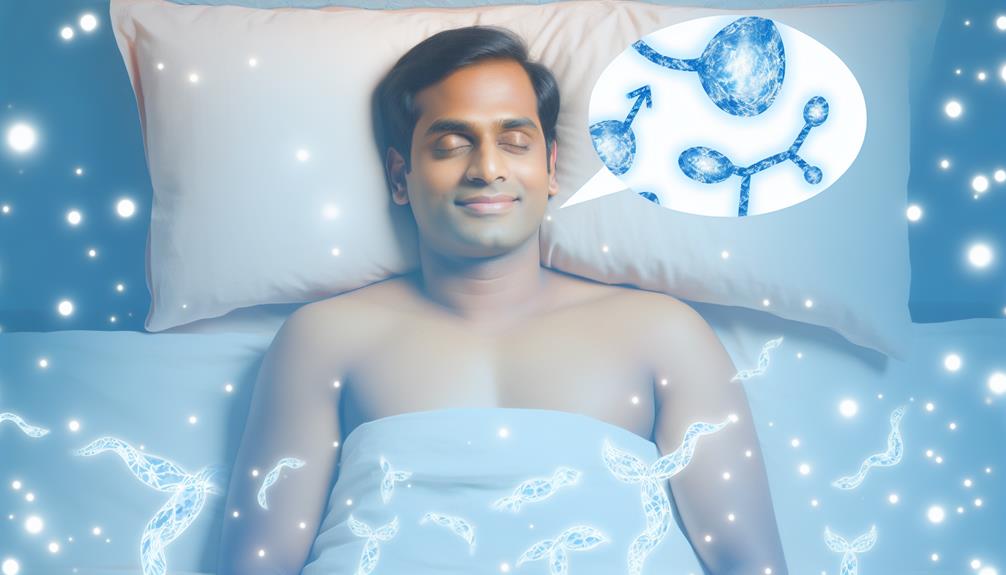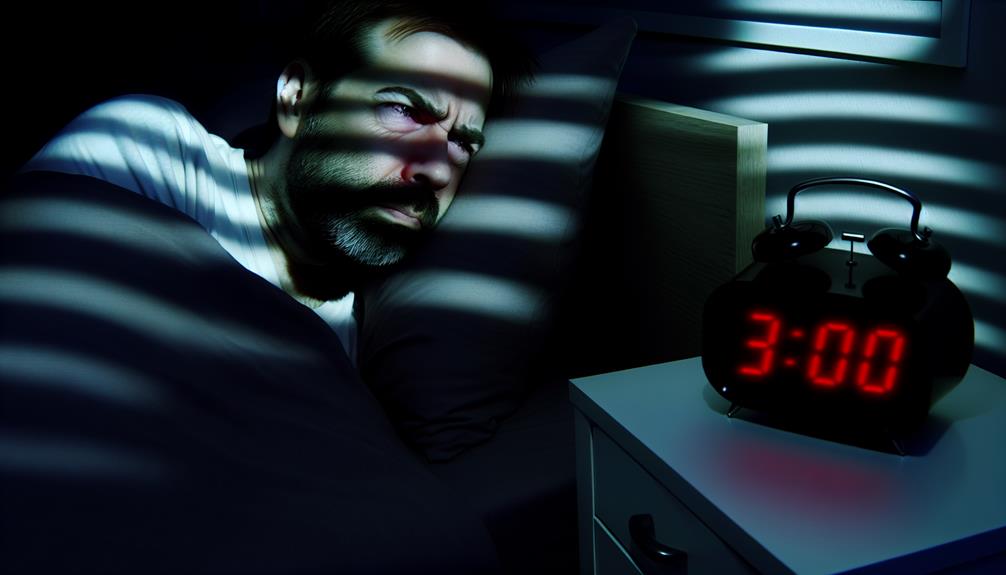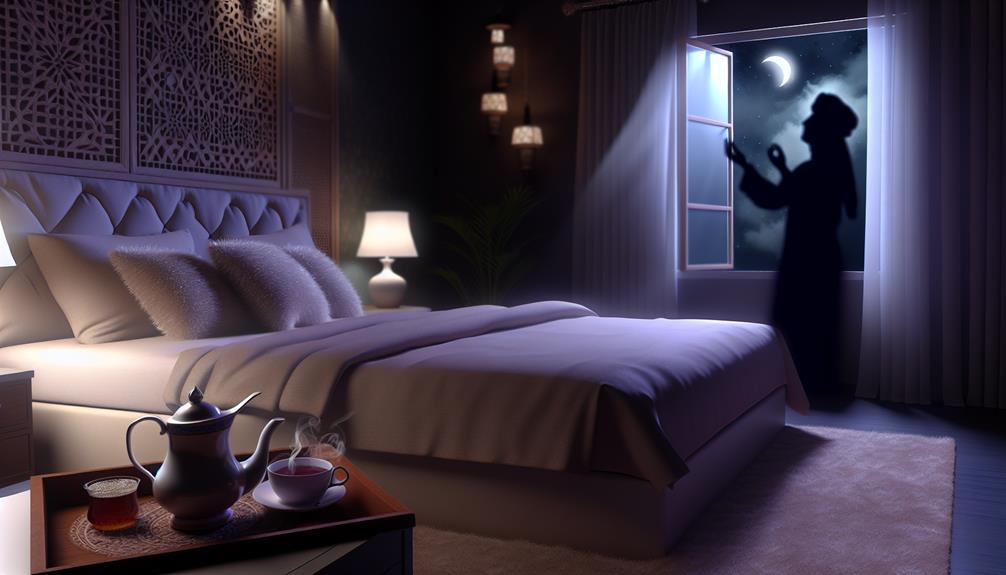I know that sleep plays an essential role in maintaining men's hormonal health, markedly influencing testosterone and other important hormones. Adequate sleep is necessary for testosterone production, mainly occurring during deep sleep stages. If I get less than seven hours, I risk lower testosterone levels, similar to being a decade older. Chronic sleep deprivation can elevate cortisol levels, which further disrupts hormonal balance and can lead to increased stress, weight gain, and mood issues. Prioritizing quality sleep is key, and if you're interested, there are effective strategies to enhance your sleep that can greatly benefit your hormonal health.
The Role of Hormones in Men's Health

When it comes to men's health, hormones play a pivotal role in regulating various bodily functions. I've come to realize that maintaining hormonal balance is vital for overall well-being. The endocrine system, which is responsible for hormone production and regulation, influences everything from metabolism to mood and libido.
For instance, testosterone is often highlighted as a key hormone for men. It impacts muscle mass, bone density, and energy levels. When testosterone levels are ideal, I feel more energetic and focused. However, when hormonal balance is disrupted—whether due to stress, poor diet, or lack of exercise—I notice changes in my mood and physical health.
Additionally, hormones like cortisol, the stress hormone, can affect other hormones when they're out of sync. High cortisol levels can lead to decreased testosterone production, which can create a domino effect on my health. I've learned that factors such as nutrition and lifestyle choices greatly influence the endocrine system.
Regular exercise and a balanced diet rich in essential nutrients can contribute to a more balanced hormonal environment. Incorporating practices that reduce stress, such as meditation or mindfulness, has also been beneficial for me.
Sleep and Testosterone Levels
Adequate sleep is fundamental to maintaining healthy testosterone levels. I've learned that our bodies rely on specific sleep cycles to enhance hormone production, particularly testosterone. Research shows that testosterone production primarily occurs during deep sleep, which is why consistent, quality rest is so essential.
When I think about sleep cycles, it's fascinating how they're structured. Each cycle lasts about 90 minutes, shifting through light sleep, deep sleep, and REM sleep. Deep sleep, in particular, plays a significant role in testosterone production. Studies indicate that men who get less than seven hours of sleep per night can experience a substantial drop in testosterone levels. In fact, one study found that men who restricted their sleep to just five hours a night had testosterone levels comparable to those of men ten years their senior.
It's not just the quantity of sleep that matters, but also the quality. Disruptions in sleep cycles can hinder the body's ability to produce testosterone effectively. I've noticed that when I prioritize my sleep, I feel more energetic and focused, which might be linked to maintaining those ideal hormone levels.
Impact of Sleep Deprivation

How does sleep deprivation affect our overall health? It's a question that often crosses my mind, especially when I notice the toll it takes on my body and mind. Lack of sleep can severely impair cognitive function, making it difficult to concentrate, remember information, or make sound decisions. Research shows that even a single night of inadequate sleep can lead to diminished alertness and increased errors in tasks requiring attention. This isn't just about feeling groggy; it's about how effectively we function in our daily lives.
Moreover, sleep deprivation triggers our stress response. When we're short on rest, our bodies produce more cortisol, the hormone associated with stress. Elevated cortisol levels can lead to a range of health issues, including anxiety, weight gain, and even compromised immune function. I've noticed that when I'm sleep-deprived, I'm more irritable and less patient, further amplifying stress in my life.
It's vital to recognize that chronic sleep deprivation doesn't just leave us feeling tired; it has far-reaching effects on our physical and mental well-being. By understanding the impact on cognitive function and the stress response, I realize the importance of prioritizing sleep. After all, a well-rested mind is not only more efficient but also better equipped to handle life's challenges. So, let's take sleep seriously—it's an essential component of maintaining our overall health and hormonal balance.
Other Hormones Affected by Sleep
Sleep deprivation not only affects cognitive function and heightens stress but also disrupts the delicate balance of various hormones in our bodies. One of the most significant hormones impacted is cortisol. Chronic sleep loss can lead to cortisol fluctuations, which may elevate stress levels, impair immune function, and negatively affect metabolism. It's fascinating to reflect on how a simple lack of sleep can throw such a fundamental hormone off balance.
Another important hormone affected by inadequate sleep is growth hormone (GH). Normally, GH is secreted in pulses during deep sleep, playing an essential role in muscle growth, fat metabolism, and overall recovery. When sleep quality suffers, the release of growth hormone diminishes, limiting our ability to recover from exercise and maintain muscle mass.
To illustrate the effects of sleep on these hormones, take a look at the following table:
| Hormone | Impact of Sleep Deprivation |
|---|---|
| Cortisol | Increased fluctuations, higher stress levels |
| Growth Hormone | Reduced secretion, impaired recovery |
Understanding these hormonal changes can empower us to prioritize sleep. If I can appreciate the intricate relationship between sleep and hormonal health, it becomes clearer that ensuring a good night's rest is not just about feeling refreshed, but about maintaining essential bodily functions. By focusing on sleep hygiene, I can foster a healthier hormonal balance that supports my overall well-being.
Tips for Better Sleep Quality

Creating a soothing bedtime environment can greatly enhance my sleep quality. I've learned that the right sleep environment is essential for relaxation and overall well-being. To start, I make sure my bedroom is dark, quiet, and cool. I use blackout curtains to block out any unwanted light and a white noise machine to drown out disruptive sounds. A cooler room temperature, around 60-67°F, promotes better sleep, so I often adjust my thermostat before bed.
Next, I focus on establishing a consistent bedtime routine. I've found that winding down for at least 30 minutes before sleep helps signal my body that it's time to rest. During this time, I engage in calming activities, such as reading a book or practicing mindfulness meditation. I avoid screens, as the blue light emitted can interfere with melatonin production, making it harder for me to fall asleep.
Additionally, I pay attention to my diet and exercise. I try to avoid heavy meals, caffeine, and alcohol close to bedtime, as these can disrupt my sleep. Gentle stretching or yoga can also be beneficial, helping to release tension in my body and prepare me for a good night's rest.
Incorporating these tips into my routine has greatly improved my sleep quality and, in turn, my hormonal health. By prioritizing my sleep environment and committing to a consistent bedtime routine, I've noticed a positive impact on my overall well-being.
Frequently Asked Questions
How Many Hours of Sleep Do Men Need for Optimal Hormonal Health?
I've found that most men need about 7 to 9 hours of sleep for ideal hormonal health. Sleep duration plays a vital role in regulating hormonal fluctuations, impacting testosterone and cortisol levels. When I consistently get enough rest, I notice improvements in my mood, libido, and energy. Conversely, inadequate sleep can lead to hormonal imbalances that affect overall well-being. Prioritizing quality sleep is essential for maintaining a healthy hormonal balance.
Can Napping During the Day Improve Hormonal Balance?
I remember when a friend of mine started napping during the day. He noticed significant napping benefits, like improved mood and focus. Napping can indeed aid in hormonal restoration by allowing the body to recover from stress and fatigue. Research suggests that short naps can boost testosterone levels and support overall hormonal balance. So, if you're feeling drained, a quick nap could be just what you need for better hormonal health.
Does Age Affect the Relationship Between Sleep and Hormones?
I've often wondered if age affects the relationship between sleep and hormones. As we get older, age-related changes can lead to hormonal fluctuations that can disrupt sleep patterns. Research shows that inadequate sleep can exacerbate these fluctuations, leading to issues like decreased testosterone levels in men. So, it's essential to prioritize quality sleep at any age to help maintain hormonal balance and overall well-being. Taking care of our sleep can make a significant difference.
Are There Specific Sleep Disorders That Impact Men's Hormonal Health?
I've learned that specific sleep disorders, like sleep apnea, can greatly impact men's hormonal health. For instance, untreated sleep apnea can lower testosterone levels, which are essential for various bodily functions. Additionally, poor sleep disrupts REM sleep, the stage important for hormone regulation. This disruption can lead to elevated cortisol levels, which can further affect mood and metabolism. Addressing these disorders is fundamental for maintaining balanced hormones and overall health.
How Can Lifestyle Changes Enhance Sleep Quality and Hormone Levels?
I've found that enhancing sleep quality and hormone levels starts with good sleep hygiene. Practicing stress management techniques, like mindfulness, helps me unwind. I pay attention to my dietary choices, avoiding heavy meals before bed, and I stick to regular exercise routines, which improve my sleep. Reducing screen time before sleep allows my body to relax. Incorporating relaxation techniques, like deep breathing, has truly made a difference in my overall well-being.
